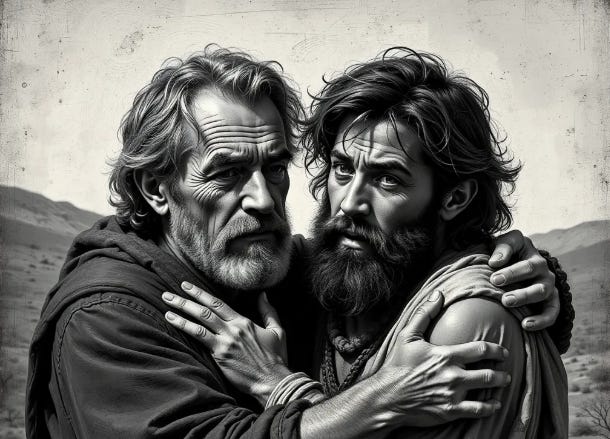Genesis 32:3–33:20: Jacob reconciles with Esau – A thoughtful exploration of this significant moment in biblical history
A profound journey of transformation, forgiveness, and fulfilled promises.
Preparing to Meet Esau
In Genesis 32:9–12, we find Jacob preparing to reunite with Esau, revisiting the source of their estranged relationship. Despite God's assurance, Jacob remains deeply afraid upon learning that Esau is approaching with 400 men. In response, Jacob turns to prayer, seeking God's guidance and remembering the promises God made to him.
Genesis 32: 9-12 (CSB): Then Jacob said, “God of my father Abraham and God of my father Isaac, the LORD who said to me, ‘Go back to your land and to your family, and I will cause you to prosper,’ I am unworthy of all the kindness and faithfulness you have shown your servant. Indeed, I crossed over to Jordan with my staff, and now I have become two camps. Please rescue me from my brother Esau, for I am afraid of him; otherwise, he may come and attack me, the mothers, and their children. You have said, ‘I will cause you to prosper, and I will make your offspring like the sand of the sea, too numerous to be counted.’”
Jacob Wrestles with God
As Jacob crossed the Jabbok (Zarqa River) with his family, he found himself in an unexpected struggle with a mysterious man. The encounter culminated in the man dislocating Jacob's hip and renaming him Israel—a sign of his victory in struggling with both God and man. This incident, described in Genesis 32:24–32, is filled with profound meaning.
Genesis 32:24-32 (CSB) Jacob Wrestles with God - (24) Jacob was left alone, and a man wrestled with him until daybreak. (25) When the man saw that he could not defeat him, he struck Jacob’s hip socket as they wrestled and dislocated his hip. (26) Then he said to Jacob, “Let me go, for it is daybreak.” But Jacob said, ‘I will not let you go unless you bless me.” (27) “What is your name?” the man asked. “Jacob,” he replied. (28) “Your name will no longer be Jacob,” he said. “It will be Israel[a] because you have struggled with God and with men and have prevailed.” (29) Then Jacob asked him, “Please tell me your name.” But he answered, “Why do you ask my name?” And he blessed him there. (30) Jacob then named the place Peniel,[b] “For I have seen God face to face,” he said, “yet my life has been spared.” (31) The sun shone on him as he passed by Penuel[c]—limping because of his hip. (32) That is why, still today, the Israelites don’t eat the thigh muscle that is at the hip socket: because he struck Jacob’s hip socket at the thigh muscle.
Key Observations:
1. The event is shrouded in mystery:
Why did God appear at night?
Why did He wrestle with Jacob yet refrain from defeating him?
2. It reflects a human experience of faith:
God often allows His people to face trials or seemingly impossible challenges.
These trials are paired with His deliverance, as seen in the prayer: “Lead us not into temptation but deliver us from evil.”
3. This pivotal moment in Jacob’s life reflects his transformation:
God brought Jacob to this crisis and ultimately brought him through it.
Jacob’s victory at the Jabbok became a pledge of his success in reconciling with Esau.
The renaming to Israel signified a new identity, symbolizing triumph and renewal.
Jacob Meets Esau
When Esau appeared, Jacob—now limping from his injury—went ahead of his family, confidently bowing in submission. To Jacob’s astonishment, Esau ran to embrace him, throwing his arms around him and kissing him.
Key Moments
1. Forgiveness and Reconciliation:
Jacob was overwhelmed by Esau's forgiveness, likening it to the grace of God. This moment is echoed in Jesus’ parable of the prodigal son (Luke 15:20).
2. Restitution:
Jacob offered Esau the blessing he once deceitfully took, which Esau reluctantly accepted.
3. Parting Ways:
Esau invited Jacob to live with him in Edom, but Jacob politely declined. Instead, Jacob entered Canaan, purchasing and landmarking the second patriarchal acquisition of real estate in the promised land.
4. Fulfillment of Promises:
Slowly, God’s promises to Jacob began to materialize, prompting him to worship and honor God.
Key Takeaways
1. Jacob’s Name Change:
Jacob reflected on his past struggles and shortcomings.
Israel symbolized a future of victory and the fulfilment of God’s promises.
2. Act of Bowing Down:
Jacob’s bowing before Esau was both a gesture of humility and a symbolic reenactment of Isaac's blessing (Genesis 27:29).
Application
Even when circumstances seem overwhelming, God is always with us. He may allow challenges to shape and strengthen us, but He also provides deliverance for His glory and our growth in Christ. In all situations, our daily strength comes from the Lord, who is faithful to guide us to victory.




